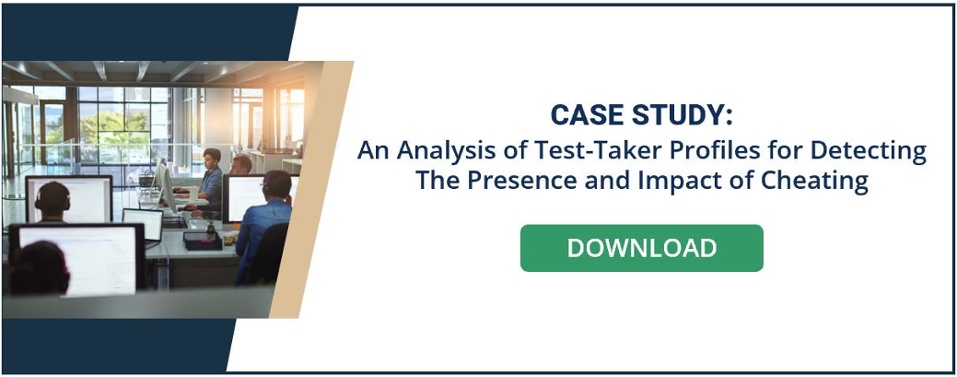
This is the second blog in a two-part blog series where I'm joined by special guests Marc Weinstein, Esq., Managing Attorney at Marc J. Weinstein LLC, and Steven Peluso, Esq., Managing Attorney at the Law Office of Steven T. Peluso, to bring you the legal aspects you should consider if you're faced with candidate misconduct.
In my first post, we reviewed how to ensure that your candidate agreement is in excellent shape, your policies are clear, processes are defined, and your exam is copyrighted. But what if you have all of this in place, and misconduct still occurs? What do you do in this circumstance?
Some organizations limit their actions to cancelling or invalidating a candidate’s test results, revoking their certification, or barring them from seeking the certification in the future. Even in these circumstances, make sure you seek legal advice before taking any such actions, as they put your organization at risk for a candidate lawsuit. This is especially true where is certification is required to continue working in the candidate’s job, trade, profession, or industry. However, what about situations that are more severe? For example, if candidates have pooled pilfered items together in a brain dump site, or have contributed stolen items to a commercial test proper operator — what other action can you take?
Keep in mind that there are two types of options to you: civil litigation or government enforcement. The credentialing organization can initiate civil litigation. Government enforcement requires the intervention of a government agency that would be required to initiate a case, which could include a regulatory action or a criminal investigation by a law enforcement, agency and potential prosecution by a state or federal prosecutor’s office.
Civil Litigation
Potential civil causes of action available to the credentialing organization can include:
-
Copyright Infringement: In circumstances where a candidate or organization has copied or reconstructed test content without permission, you can pursue a civil copyright infringement claim. This can include a wide range of examples, such as stealing a full test or even just memorizing a few items and reconstructing them. If the certification organization can demonstrate that the copied or reconstructed content is substantially similar to the original content of the certification test that is covered by a valid copyright registration, copyright infringement. In fact, in cases where you registered the copyright for your exam or the items contained in your exam before they were infringed, the credentialing organization may be able to recover statutory damages.. You can read more about statutory damages here.
-
Misappropriation of Trade Secrets: Where a credentialing organization takes reasonable measures to ensure the security and confidentiality of its test content, and requires any person with access to the test content to enter into confidentiality agreements, any person or company who discloses and/or distributes that content without permission for their own benefit, knowing of its confidential nature, and causes damages to the credentialing organization, is subject to suit for misappropriation of trade secrets.
-
Intentional Interference with Contractual Relations: In cases where a person or company asks a candidate that is subject to a confidentiality agreement with the credentialing organization to obtain or disclose actual test content , and the offending person or company is aware or reasonably should be aware of the existence of the candidate’s confidentiality obligation, and the candidate’s disclosure of such test content causes damages to the organization, the credentialing organization can pursue a claim for intentional interference with the credentialing organization’s contract with the candidate.
-
Breach of Contract: If a candidate or any other party that is a party to a contract with the credentialing organization that requires the candidate or third party to keep the content of the exam confidential, and the candidate or other party discloses exam content in violation of the terms of that contract, thereby causing damages to the credentialing organization, for example needing to "trash" an active exam form due to disclosure of the items, the organization can pursue a claim against the breaching parties for breach of contract.
Government Enforcement
Potential criminal government enforcement actions that a credentialing organization could urge the applicable government authorities to bring include:
-
Copyright Infringement: There are four essential elements to a charge of criminal copyright infringement under 17 U.S.C. § 506(a). The government must have evidence: (1) that a valid copyright; (2) was infringed by the defendant; (3) willfully; and (4) for purposes of commercial advantage or private financial gain.
Attempts to infringe are prohibited to the same extent as the completed act. Conspiracies to violate the Act can be prosecuted under 18 U.S.C. § 371. This charge would be most appropriate in the case of a commercial test prep operator selling or distributing brain dumped test content for a fee.
-
State Law Fraud Offenses: Various state statutes provide for the criminal prosecution of fraud such as: schemes to defraud; falsifying business records; and criminal impersonation. These state law offenses were used in a state criminal prosecution of the people involves in a 2011 cheating scandal in Manhasset, NY, in which proxy test takers were paid to sit for the SAT.
-
Computer Fraud and Abuse Act: A candidate can be charged with a criminal violation of the Computer Fraud and Abuse Act if the candidate knowingly and with intent to defraud accessed a computer that is connected to the Internet in order to access the credentialing exam without authorization and/or exceeded his authorized access to such computer, to obtain confidential exam content, and caused harm to the credentialing organization by accessing that content.
-
Racketeering Statutes: When individuals committing misconduct engage in a series of criminal acts as part of or in connection with an organization, for the purpose of achieving illegal objectives, those individuals may be subject to crimping prosecution under laws prohibiting Racketeer Influence Corrupt Organizations (“RICO”). In two recent examples, the college cheating admissions scandal and the Atlanta public schools cheating scandal, the prosecution charged certain individuals with offense under federal and state RICO statues, respectively.
-
Federal Mail and Wire Fraud Statutes: Federal laws prohibit the use of the US mail, telephone lines or the Internet in any scheme to defraud that results in a financial loss and affects interstate commerce. The Department of Justice recently pursued mail and wire fraud charges against the perpetrators of the college admissions cheating scandal.
-
Licensure Action: A credentialing organization may be able to (and may be required to in some instances) report a candidate’s misconduct to the applicable state professional licensure agency if the candidate holds a professional license, or the credential of the organization is required to obtain a particular license. Such reporting by the credentialing organization would empower the licensure agency to investigate and potentially take action against the person’s professional license.
Before you pursue any civil cause of action or seek government enforcement action in relation to a suspected test theft or test fraud matter, make sure you consult with an experienced attorney. In addition, use other resource documents available from industry organizations, for example the Legal Protection of Examination Content article published by the Association of Test Publishers.
While many measures can be taken to decrease the likelihood of candidate misconduct from occurring, the next line of defense is to ensure that you can take the appropriate legal actions in the most effective and timely manner.


 Rory McCorkle, PhD. is the Senior Vice President, Certification & Admissions at PSI Services LLC. He has extensive experience both managing and consulting for credentialing programs, specializing in the strategic organization of these programs, their design and development. During his career, Rory has worked with over 350 associations and IT credentialing organizations, including well-known licensure programs and globally renowned certifications. Rory received his PhD in Organizational Leadership from The Chicago School of Professional Psychology, as well as his MBA from Drexel University’s College of Business.
Rory McCorkle, PhD. is the Senior Vice President, Certification & Admissions at PSI Services LLC. He has extensive experience both managing and consulting for credentialing programs, specializing in the strategic organization of these programs, their design and development. During his career, Rory has worked with over 350 associations and IT credentialing organizations, including well-known licensure programs and globally renowned certifications. Rory received his PhD in Organizational Leadership from The Chicago School of Professional Psychology, as well as his MBA from Drexel University’s College of Business.